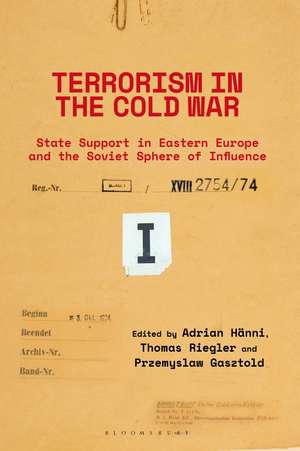Terrorism in the Cold War: State Support in Eastern Europe and the Soviet Sphere of Influence
Editat de Adrian Hänni, Thomas Riegler, Przemyslaw Gasztolden Limba Engleză Paperback – 23 mar 2022
| Toate formatele și edițiile | Preț | Express |
|---|---|---|
| Paperback (2) | 197.34 lei 6-8 săpt. | |
| Bloomsbury Publishing – 23 mar 2022 | 197.34 lei 6-8 săpt. | |
| Bloomsbury Publishing – 23 mar 2022 | 198.85 lei 6-8 săpt. | |
| Hardback (2) | 597.87 lei 6-8 săpt. | |
| Bloomsbury Publishing – 16 sep 2020 | 597.87 lei 6-8 săpt. | |
| Bloomsbury Publishing – 16 sep 2020 | 599.25 lei 6-8 săpt. |
Preț: 197.34 lei
Preț vechi: 257.63 lei
-23% Nou
Puncte Express: 296
Preț estimativ în valută:
37.76€ • 39.64$ • 31.34£
37.76€ • 39.64$ • 31.34£
Carte tipărită la comandă
Livrare economică 11-25 aprilie
Preluare comenzi: 021 569.72.76
Specificații
ISBN-13: 9780755636563
ISBN-10: 0755636562
Pagini: 224
Dimensiuni: 156 x 234 x 15 mm
Greutate: 0.32 kg
Editura: Bloomsbury Publishing
Colecția Bloomsbury Academic
Locul publicării:London, United Kingdom
ISBN-10: 0755636562
Pagini: 224
Dimensiuni: 156 x 234 x 15 mm
Greutate: 0.32 kg
Editura: Bloomsbury Publishing
Colecția Bloomsbury Academic
Locul publicării:London, United Kingdom
Caracteristici
Wide-ranging international study with examples from North Korea, Bulgaria and Russia
Notă biografică
Adrian Hänni is Lecturer for Political History at Distance Learning University, Switzerland. He was previously postdoctoral fellow at University of Leiden and Lecturer in History at Univesity of Zurich. He holds a PhD from University of Zurich. Thomas Riegler is an Affiliate Researcher at the Austrian Centre for Intelligence, Propaganda and Security Studies at the University of Graz. He is a member of the Editorial Board for the academic journal Perspectives on Terrorism. Przemyslaw Gasztold is a research fellow at the Historic Research Office of the Institute of National Remembrance in Warsaw. He received his Ph.D. from Warsaw University in 2016.
Cuprins
1. Introduction - State Support for Terrorist Actors in the Cold War: Myths and Reality - Adrian Hänni,2. The KGB's Abduction Program and the PFLP: On the Cusp between Intelligence and Terrorism - Isabella Ginor and Gideon Remez3. Soviet Approaches to Muslim Extremism and Terrorism - Michael Fredholm4. Palestinian Terrorism and the State Security of the GDR: Abu Nidal between East Berlin, Moscow and Washington 1973-1989 - Tobias Wunschik5. Polish Military Intelligence and Its Secret Relationship with the Abu Nidal Organization - Przemyslaw Gasztold6. Carlos the Jackal in Prague: Communist Czechoslovakia and International Terrorism - a Case Study - Pavel Zácek7. Hungarian State Security and International Terrorism in the 1980s - Balázs Orbán-Schwarzkopf8. Bulgarian State Security and International Terrorism - Jordan Baev9. Yugoslavia, Carlos "the Jackal" and International Terrorism During the Cold War - Gordan Akrap10. North Korea's "Terrorism" and "Counterterrorism" in the Late 1980s - Bernd Schaefer
Recenzii
This book offers a distinctive and thorough perspective on terrorism during the Cold War era through case study analysis as well as access to unique historical material.
Overall, the two volumes of Terrorism in the Cold War represent an important ontological contribution to our understanding of why and how state interact and, in some cases, create alliances with violent non-state actors. The volumes of essay will be of interest to all those looking to appreciate the complexity of state-terrorist relations and grasp the paradoxes born out of these liaisons ... By using new evidence to reconnect the dots on state-terrorist relations, these essays help us rethink what we know about the international history of terrorism as well as the Cold War
Overall, the two volumes of Terrorism in the Cold War represent an important ontological contribution to our understanding of why and how state interact and, in some cases, create alliances with violent non-state actors. The volumes of essay will be of interest to all those looking to appreciate the complexity of state-terrorist relations and grasp the paradoxes born out of these liaisons ... By using new evidence to reconnect the dots on state-terrorist relations, these essays help us rethink what we know about the international history of terrorism as well as the Cold War
